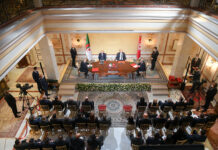May 31, 2021
The United Nations requires the Libyan authorities to withdraw “mercenaries” and all foreign forces as a prerequisite for the country’s stability and the security of the region as a whole, in a measure supported by the United States and Britain.
The UN envoy, Ján Kubiš, said that the withdrawal of foreign fighters, disarmament, and the subsequent ceasefire is a measure that would anchor Libya to safety, and thus the legislative and presidential elections will take place as scheduled on December 24, 2021.
For her part, Libyan Foreign Minister Najla Al-Manqoush always reminds of the need to start the process of withdrawing mercenaries and foreign forces within a clear framework and clear timetables, and that she is in constant contact with the concerned countries in order to hand over the fighters arrested in Libya to their countries of origin, including Tunisia.
A Growing Threat
A large number of Tunisian observers expressed their fear of the return of the elements that participated in the Libyan civil war over a period of 7 years to Tunisia, and considered that they represent an increasing threat to security in Tunisia, especially since most of the terrorist operations were carried out by returnees from trouble spots.
Previous UN reports estimated the number of Tunisians in the conflict zones at about 5,500, of whom between 1,000 and 1,500 were fighting in Libya, with the militant organizations.
Waiting Deal?
On the sidelines of Prime Minister Hishem al-Meshishi’s visit to Libya, there was a rumor behind the scenes that a deal was to be signed by Al-Meshishi with his Libyan counterpart, according to which Tunisian prisoners involved in terrorist cases would be handed over.
Beshir Jouini, a researcher in international relations and a former Tunisian diplomat, confirmed in a statement to JDD Tunisia that Tunisia has already submitted a request for the extradition of detainees whose involvement has been proven, regardless of their crimes and types.
Al-Jouini added that the detainees could not be described as mercenaries, since they did not participate with the two parties in the conflict in the Libyan war, as they are extremist elements, who were arrested by the Libyan state and kept in its prisons.
He continued, “The Tunisian state is in contact with its Libyan counterpart in order to end the process of handing them over, and the presidency of the republic has contacted directly with the Libyan official and civil authorities and all organizations working on this file, and accordingly, a number of children from the families of Tunisian fighters in Libya were handed over.
Agreements Since the 1980s
Al-Jouini stated that the Tunisian request to surrender the fighters is subject to agreements between the Tunisian and Libyan ministries of justice, some of which date back to the 1980s and regulate all of the trial parts, whether in Tunisia or in Libya.
He pointed out that it cannot be considered a deal as it is an application of binding agreements related to the extradition of criminals, regardless of the type of their crimes, saying, “The return of combatants to Tunisia is an international demand in addition to its being a humanitarian and national demand.”
Sufficient Guarantees
In a statement to JDD Tunisia, Libyan analyst Ezzddine Akil stated that Tunisian fighters who participated in the Libyan conflict are arrested by both parties of the conflict.
He added that the transfer of these individuals from Libyan prisons to Tunisian ones must be based on a formal and tight agreement between the two countries, provided that all guarantees are available, stressing that the Libyan side will take great care of the ability of the Tunisian logistical structures related to its detention centers and prisons to accommodate them.
Akil also indicated that Libya does not want Tunisia to implicate in these detainees because they represent a threat to security in the region, saying, “If Libya sees that Tunisia is unable to control them, and this is a weak possibility, it will not hand them over to them, so their escape necessarily means their return to the Libyan lands. As it is the most suitable place for them at the moment.
Libyan Deposit
The Libyan political analyst said that the surrender of fighters may be linked to a Libyan deposit that may be placed in Tunisian banks and may contribute to moving the Tunisian economy wheel, adding that part of the proceeds from this deposit could be spent on developing the prison and detention camp system, and thus Tunisia can contain people like these with a degree of security firmness. This guarantees that they will not find a way to escape.
Our interlocutor also suggested the possibility of forming a joint committee between the two countries to assess the level of prisons and the different conditions that require the extradition of these fighters, and if it turns out that the conditions are appropriate, each party will play its role in this purpose.











